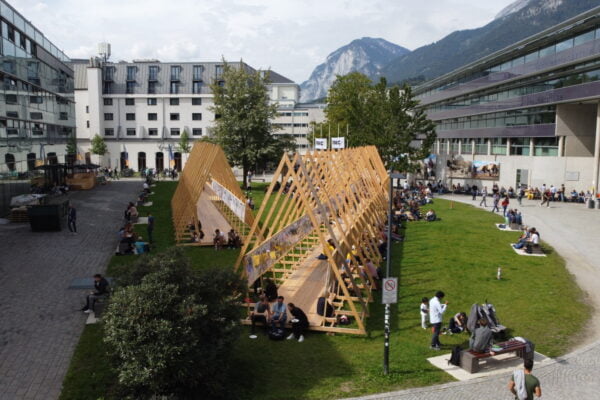
NAME:
SOWI - Garden
BUILDING:
SOWI
FLOOR:
0
TYPE:
Garden
CAPACITY:
2000
ACCESS:
Public Access
EQUIPMENT:
---
Skiing is a traditional way of moving across and on snow and is central to winter tourism industries across Northern, Arctic, and Alpine contexts: cross country skiing, downhill skiing, ski touring, ski mountaineering, and fell skiing are just a few examples of tourist activities in the snowy landscapes. However, climate change and lessened snow threaten these landscapes and the ski business. These drastic climate-related changes in the winter tourism industry and the interrelated questions on its sustainability have attracted significant academic attention. For example, quantitative approaches estimate the decline of potential ‘optimal ski days’, the snow security of specific regions and their link to technical snowmaking, their economic viability related to demographic change, as well as the energy use and emission intensity of ski tourism .
So far, current methodologies stay at an analytical distance from the practice of skiing itself and are less apt to explore the place-based, relational, and entangled ways of ‘being’ and ‘doing’ winter tourism that skiing fosters and disrupts. They are built on an anthropocentric worldview (i.e., nature as a valuable resource only in relations with humans and profits) rather than an ecocentric understanding (i.e., an interdependent, entangled world of all human and other-than-human organisms) of the value of snow landscape and entanglements with them.
In this paper, we propose skiing-with as a methodological exploration of being proximate with snowy landscapes and the crisis they face. By building on the tradition of walking-with methods, we explore how skiing-with as a proximate ethnographic methodology helps us to think with the current challenges around sustainability from an onto-epistemological point of view, where the core is to open oneself up to relationality – that is, the entanglement of both human and non-human actors. By doing this, we illustrate a feminist and posthuman application of ethnographic methodology for thinking about sustainability in tourism research.

We and use cookies and other tracking technologies to improve your experience on our website. We may store and/or access information on a device and process personal data, such as your IP address and browsing data, for personalised advertising and content, advertising and content measurement, audience research and services development. Additionally, we may utilize precise geolocation data and identification through device scanning.
Please note that your consent will be valid across all our subdomains. You can change or withdraw your consent at any time by clicking the “Consent Preferences” button at the bottom of your screen. We respect your choices and are committed to providing you with a transparent and secure browsing experience.